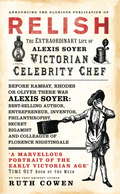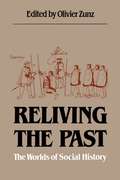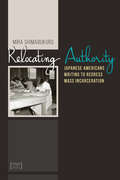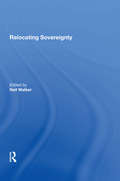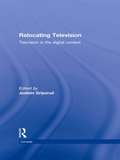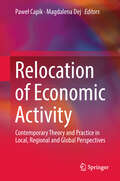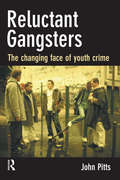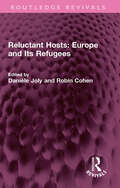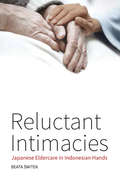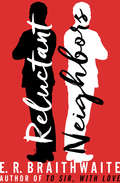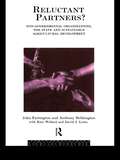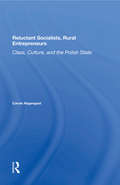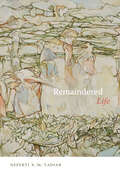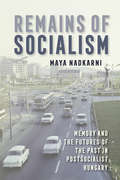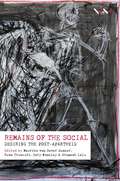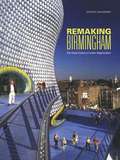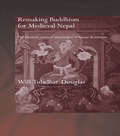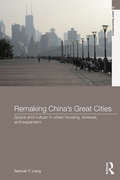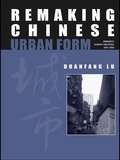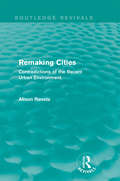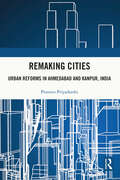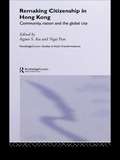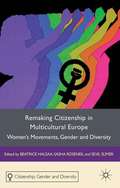- Table View
- List View
Relish: The Extraordinary Life of Alexis Soyer, Victorian Celebrity Chef
by Ruth CowenFascinating biography of a 19th-century celebrity chefRarely has a man defined the spirit of an age as well as Alexis Soyer: celebrity chef, best-selling author, entrepreneur, inventor, philanthropist and Crimean war hero. Soyer built the world famous kitchens of London's Reform Club - which he filled with such ingenious inventions as the gas stove and steam lifts. He set up the most innovative culinary theme park ever seen in the capital, and devised the sauces and relishes that would make household names of Mr Crosse and Mr Blackwell. In the 1840s he set up revolutionary soup kitchens during the Irish potato famine, and in the following decade risked his life by travelling to the Russian peninsula to reform army catering for the troops - saving thousands of soldiers from the effects of malnutrition. Alexis Soyer was one of the most famous names of the early Victorian age, and his legacy lives on through the radical army reforms his work set in train. He was also ¿ in a similar spirit of the age - a secret womaniser, near bankrupt and alcoholic.Yet this brilliant man, who during his lifetime was more famous than the men he regularly brushed shoulders with - men such as Thackeray, Disraeli, Dickens and Palmerston - dropped completely from public view after his untimely death. His friend Florence Nightingale, never one to praise lightly, wrote that his passing was 'a great disaster' for the nation. Yet despite making several fortunes he died virtually penniless, his personal papers were destroyed, his funeral was a hushed-up affair and today his grave lies neglected and rotting in Kensal Green cemetery. This is the first full length, fully researched biography of Alexis Soyer, which explores the life, career and legacy of one of the most enigmatic and extraordinary figures of the Victorian age.
Reliving the Past
by Charles Tilly William B. Taylor Olivier Zunz David William CohenFive historians uncover the ties between people's daily routines and the all-encompassing framework of their lives. They trace the processes of social construction in Western Europe, the United States, Latin America, Africa, and China, discussing both the historical similarities and the ways in which individual history has shaped each area's development. They stress the need for a social history that connects individuals to major ideological, political, and economic transformations.
Relocating Authority: Japanese Americans Writing to Redress Mass Incarceration (Nikkei in the Americas)
by Mira ShimabukuroRelocating Authority examines the ways Japanese Americans have continually used writing to respond to the circumstances of their community’s mass imprisonment during World War II. Using both Nikkei cultural frameworks and community-specific history for methodological inspiration and guidance, Mira Shimabukuro shows how writing was used privately and publicly to individually survive and collectively resist the conditions of incarceration. Examining a wide range of diverse texts and literacy practices such as diary entries, note-taking, manifestos, and multiple drafts of single documents, Relocating Authority draws upon community archives, visual histories, and Asian American history and theory to reveal the ways writing has served as a critical tool for incarcerees and their descendants. Incarcerees not only used writing to redress the “internment” in the moment but also created pieces of text that enabled and inspired further redress long after the camps had closed. Relocating Authority highlights literacy’s enduring potential to participate in social change and assist an imprisoned people in relocating authority away from their captors and back to their community and themselves. It will be of great interest to students and scholars of ethnic and Asian American rhetorics, American studies, and anyone interested in the relationship between literacy and social justice.
Relocating Sovereignty (The\international Library Of Essays In Law And Legal Theory (second Series) Ser.)
by Neil WalkerThis volume brings together a collection of classic and contemporary texts which engage with the core problem of sovereignty from the perspective of various legal and law-related sub-disciplines: legal history and theory, constitutional law, international law and relations and EU law. Many of the highlights from the intense debates about the continuing relevance or otherwise of the internal sovereignty of national legal orders and the external sovereignty of states in a rapidly- globalizing world are reproduced here.c
Relocating Television: Television in the Digital Context (Comedia)
by Gripsrud JosteinFor over half a century, television has been the most central medium in Western democracies – the political, social and cultural centrepiece of the public sphere. Television has therefore rarely been studied in isolation from its socio-cultural and political context; there is always something important at stake when the forms and functions of television are on the agenda. The digitisation of television concerns the production, contents, distribution and reception of the medium, but also its position in the overall, largely digitised media system and public sphere where the internet plays a decisive role. The articles in this comprehensive collection are written by some of the world’s most prominent scholars in the field of media, communication and cultural studies, including critical film and television studies. Relocating Television offers readers an insight into studying television alongside the internet, participatory media and other technocultural phenomena such as DVDs, user-generated content and everyday digital media production. It also focuses on more specific programmes and phenomena, including The Wire, MSN, amateur footage in TV news, Bollywoodization of TV news, YouTube, fan sites tied to e.g. Grey's Anatomy and X Factor. Relocating Television will be highly beneficial to both students and academics across a wide range of undergraduate and postgraduate courses including media, communication and cultural studies, and television and film studies.
Relocation of Economic Activity: Contemporary Theory and Practice in Local, Regional and Global Perspectives
by Paweł Capik Magdalena DejThis timely volume provides a thorough analysis of current trends in location and relocation of economic activity globally, regionally and locally. Using robust empirical material this book offers a multidisciplinary, comprehensive overview, critique and extension of long-established theories underpinning patterns of firm (re)location. It explores dominant trends in the mobility and relocation of industries and firms, examines the factors guiding such trends and evaluates their consequences in both developed and emerging economies in Europe, Asia and Latin America.This book will be appreciated by diverse audiences. Geography and regional science researchers of ‘economic activity location’ can engage with the critical appraisal of key theoretical concepts and an analysis of recent empirical data. Students of human and economic geography, planning, regional development, and global supply chain management in senior years of undergraduate programmes and completing postgraduate degrees will appreciate the accessible language, multiple examples and graphical illustrations of theoretical frameworks underpinning location and relocation of firms and industries, and its consequences. Practitioners, including local and regional policy makers and location consultants will enjoy the comparative discussion of solutions and practices adopted in localities, regions and countries as diverse as China, Brazil, The Netherlands and Poland.
Reluctant Gangsters: The Changing Face of Youth Crime
by John PittsThis book provides an account of the emergence, nature and impact of armed youth gangs in an East London Borough over the last decade. It describes the challenges these armed young men and women pose to their communities, those charged with preventing crime and those struggling to vouchsafe 'community safety'. While the focus of the book is 'local', the processes it outlines and the effects it chronicles have both a national and international relevance. It argues that the main reason behind the emergence of the armed youth gang has been the coalesence of two previously discreet socially deviant groups; the rowdy, episodically criminal, adolescent peer group on the one hand and the locally-based organized criminal network on the other. The book analyses the impact of the globalisation of the drugs trade and the consequent shift in the focus of local organized crime from the 'blag' to the 'business'. It also discusses how socio-economic and cultural factors, as well as family and neighbourhood histories and loyalties and localized racial antagonisms all play their part in the emergence of the armed youth gang.
Reluctant Hosts: Europe and Its Refugees (Routledge Revivals)
by Robin Cohen Danièle JolyNow reissued with a new Preface by Robin Cohen and Danièle Joly this book was originally published in 1989 at a time when the reality of a single European Community had begun to materialize the comfortable belief that many European countries offered havens for those fleeing persecution was undermined as governments sought to cope with xenophobic and racist sentiments by their indigenous populations. This book, with contributions from social scientists, policy-makers and representatives from many European countries discusses the response of European governments to the increasing demands by asylum-seekers, refugees and exiles for admission, settlement and protection: issues which remain as pertinent today as when the book was originally published.
Reluctant Intimacies: Japanese Eldercare in Indonesian Hands
by Beata ŚwitekBased on seventeen months of ethnographic research among Indonesian eldercare workers in Japan and Indonesia, this book is the first ethnography to research Indonesian care workers’ relationships with the cared-for elderly, their Japanese colleagues, and their employers. Through the notion of intimacy, the book brings together sociological and anthropological scholarship on the body, migration, demographic change, and eldercare in a vivid account of societal transformation. Placed against the background of mass media representations, the Indonesian workers’ experiences serve as a basis for discussion of the role of bodily experience in shaping the image of a national “other” in Japan.
Reluctant Neighbors: Honorary White, Reluctant Neighbors, And A Kind Of Homecoming
by E. R. BraithwaiteThe acclaimed author of To Sir, With Love recalls his lifelong struggle against ignorance and racism while sharing a train ride with a bigoted white neighborOn a commuter train traveling from New Canaan, Connecticut, to New York&’s Grand Central Station, a well-heeled white suburbanite reluctantly takes the only available seat and eventually strikes up a conversation with the black man sitting next to him. The white businessman&’s verbal barrage of insensitive questions and offensive remarks incites a rage in his black neighbor that can barely be suppressed. But the offended rider is E. R. Braithwaite—former Royal Air Force pilot, Cambridge graduate, schoolteacher, social worker, diplomat, and bestselling author—and he has triumphed over prejudice and hatred throughout his truly extraordinary life and multifaceted career.Against the backdrop of a short railway commute, E. R. Braithwaite powerfully recounts a personal history of remarkable accomplishments in the face of bigotry and hatred. Part memoir, part treatise on racial intolerance and oppression, and the ignorance that engenders them, Reluctant Neighbors is the unforgettable story of one man&’s continuous struggle against injustice and his unwavering dedication to the pursuit of human dignity.
Reluctant Partners? Non-Governmental Organizations, the State and Sustainable Agricultural Development (Non-Governmental Organizations series)
by Anthony Bebbington David J. Lewis John Farrington Kate WellardReluctant Partners? combines comprehensive empirical insights into NGOs' work in agriculture with wider considerations of their relations with the State and their contribution to democratic pluralism. This overview volume for the Non-Governmental Organizations series contextualizes and synthesizes the case study material in the three regional volumes on Africa, Asia and Latin America, where over sixty specially commissioned case studies of farmer-participatory approaches to agricultural innovation are presented.Specific questions are raised. How good/bad are NGOs at promoting technological innovation and addressing contraints to change in peasant culture? How effective are NGOs at strengthening local organizations? How do/will donor pressures influence NGOs and their links to the State?
Reluctant Socialists, Rural Entrepreneurs: Class, Culture, And The Polish State
by Carole NagengastPREDOMINANTLY A RURAL NATION, Poland is most often depicted with urban scenes: steelworkers, trade unions, Communist party members, and Solidarity meetings. In contrast to this industrial vision, Reluctant Socialists, Rural Entrepreneurs views historical and recent changes and their agrarian consequences.During her many years in the Polish countryside, Dr. Nagengast has observed,studied, and worked side by side with farmers and other members of the agrarian class. Here she provides a first-hand perspective on the monumental failures of the Polish version of socialism, which were largely due to decisions that led the nation-state down a distinctly capitalist path to agrarian development. On the basis of her extensive research, Nagengast makes chilling forecasts about the impact of the accelerating development of capitalism on the culture, politics, and economy of Poland.This book will be useful to anthropologists, sociologists, and scholars interested in Eastern European and socialist studies.
Remain: Art And War In Times Of Theatrical Reenactment (In Search of Media)
by Jussi Parikka Rebecca Schneider Ioana B. JucanEngaging with remains and remainders of media cultures As new, as current, as now—this is primarily our understanding of technologies and their mediating of our social constructions. But past media and past practices continue to haunt and inflect our present social and technical arrangements. To trace this haunting, two performance theorists and a media theorist engage in this volume with remains and remainders of media cultures through the lenses of theatre and performance studies and of media archaeology. They address the temporalities and materialities of remain(s), the production of obsolescence in relation to the live body, and considerations of cultural memory as well as of infrastructure and the natural history of media culture.
Remaindered Life
by Neferti X. TadiarIn Remaindered Life Neferti X. M. Tadiar offers a new conceptual vocabulary and framework for rethinking the dynamics of a global capitalism maintained through permanent imperial war. Tracking how contemporary capitalist accumulation depends on producing life-times of disposability, Tadiar focuses on what she terms remaindered life—practices of living that exceed the distinction between life worth living and life worth expending. Through this heuristic, Tadiar reinterprets the global significance and genealogy of the surplus life-making practices of migrant domestic and service workers, refugees fleeing wars and environmental disasters, criminalized communities, urban slum dwellers, and dispossessed Indigenous people. She also examines artists and filmmakers in the Global South who render forms of various living in the midst of disposability. Retelling the story of globalization from the side of those who reach beyond dominant protocols of living, Tadiar demonstrates how attending to remaindered life can open up another horizon of possibility for a radical remaking of our present global mode of life.
Remains of Socialism: Memory and the Futures of the Past in Postsocialist Hungary
by Maya NadkarniIn Remains of Socialism, Maya Nadkarni investigates the changing fates of the socialist past in postsocialist Hungary. She introduces the concept of "remains"—both physical objects and cultural remainders—to analyze all that Hungarians sought to leave behind after the end of state socialism.Spanning more than two decades of postsocialist transformation, Remains of Socialism follows Hungary from the optimism of the early years of transition to its recent right-wing turn toward illiberal democracy. Nadkarni analyzes remains that range from exiled statues of Lenin to the socialist-era "Bambi" soda, and from discredited official histories to the scandalous secrets of the communist regime's informers. She deftly demonstrates that these remains were far more than simply the leftovers of an unwanted past. Ultimately, the struggles to define remains of socialism and settle their fates would represent attempts to determine the future—and to mourn futures that never materialized.
Remains of the Social: Desiring the post-apartheid
by Ross TruscottAn interdisciplinary volume of essays that engages with what ‘the social’ might mean after apartheid. Remains of the Social is an interdisciplinary volume of essays that engages with what 'the social' might mean after apartheid; a condition referred to as 'the post-apartheid social'. The volume grapples with apartheid as a global phenomenon that extends beyond the borders of South Africa between 1948 and 1994 and foregrounds the tension between the weight of lived experience that was and is apartheid, the structures that condition that experience and a desire for a 'post-apartheid social' (think unity through difference). Collectively, the contributors argue for a recognition of the 'the post-apartheid' as a condition that names the labour of coming to terms with the ordering principles that apartheid both set in place and foreclosed. The volume seeks to provide a sense of the terrain on which 'the post-apartheid' - as a desire for a difference that is not apartheid's difference - unfolds, falters and is worked through.
Remake, Remodel: Women's Magazines in the Digital Age
by Brooke Erin DuffyWhat is a magazine? For decades, women's magazines were regularly published, print-bound guidebooks aimed at neatly defined segments of the female audience. Crisp pages, a well-composed visual aesthetic, an intimate tone, and a distinctive editorial voice were among the hallmarks of women's glossies up through the turn of this century. Yet amidst an era of convergent media technologies, participatory culture, and new demands from advertisers, questions about the identity of women's magazines have been cast up for reflection. Remake, Remodel: Women's Magazines in the Digital Age offers a unique glimpse inside the industry and reveals how executives and content creators are remaking their roles, their audiences, and their products at this critical historic juncture. Through in-depth interviews with women's magazine producers, an examination of hundreds of trade press reports, and in-person observations at industry summits, Brooke Erin Duffy chronicles a fascinating shift in print culture and technology from the magazine as object to the magazine as brand. She draws on these findings to contribute to timely debates about media producers' labor conditions, workplace hierarchies, and creative processes in light of transformed technologies and media economies.
Remaking Birmingham: The Visual Culture of Urban Regeneration
by Liam KennedyThe city of Birmingham offers a particularly rich case study on urban regeneration as it strives to build a new city image. Positioned between decline and regeneration, the landscape of the city and its environs collages old and new, producing dramatic contrasts - of industrial and post-industrial urbanisms of crumbling brutalism and spectacular flagship developments, of Victorian housing and diverse cultural lifestyles - that compound the aesthetic and socio-economic means of regeneration. This visually exciting book also reflects upon and extends current debates about public space, cultural zoning and the futures of cities.
Remaking Buddhism for Medieval Nepal: The Fifteenth-Century Reformation of Newar Buddhism
by Will Tuladhar-DouglasWill Tuladhar-Douglas sheds new light on an important branch of Mahayana Buddhism and establishes the existence, character and causes of a renaissance of Buddhism in the fifteenth century in the Kathmandu Valley of Nepal. He provides the basis for the historical study of Newar Buddhism as one distinct tradition among the many that comprise Indic Buddhism. Through a thorough study of the relevant texts in the classical Himalayan languages (Sanskrit, Newari, Tibetan and Nepali), the book puts forward a new thesis about how the Newars legitimated and reinvented their tradition by devising new concepts of canonicity, as such it will appeal to scholars of the history and philology of Buddhism.
Remaking China's Great Cities: Space and Culture in Urban Housing, Renewal, and Expansion (Asia's Transformations)
by Samuel Y. LiangChina’s rapid urbanization has restructured the great socialist cities Beijing, Shanghai, and Guangzhou into mega cities that embrace global capitalism. This book focuses on the urban transformations of these three cities: Beijing is the nation’s political and cultural capital; Shanghai is the economic and financial powerhouse; and Guangzhou is the capital of Guangdong Province and the regional center of south China. All are historical cities with rich imperial, colonial, and regional heritages, and all have been drastically transformed in the last six decades. This book examines the cities’ continuous urban legacies since 1949 in relation to state governance, economic reforms, and cultural production. By adopting local historical perspectives, it offers more nuanced accounts of the current urban change than the modernization/globalization paradigm and conceptualizes the change in the context of the cities’ socialist, colonial, and imperial legacies. Specifically, Samuel Y. Liang offers an overview of the urban planning and territorial expansion of the great cities since 1949; explores the production and consumption of urban housing, its spatial forms, media representations, and socio-political implications; and examines the state-led redevelopment of old urban cores and residential neighborhoods, and the urban conservation movement. Remaking China’s Great Cities will be of great interest to students and scholars working across a range of fields including Chinese studies, Chinese culture and society, urban studies and architecture.
Remaking Chinese Urban Form: Modernity, Scarcity and Space, 1949-2005 (Planning, History and Environment Series)
by Duanfang LuIn this pioneering study of contemporary Chinese urban form, Duanfang Lu provides an analysis of how Chinese society constructed itself through the making and remaking of its built environment. She shows that as China’s quest for modernity created a perpetual scarcity as both a social reality and a national imagination, the realization of planning ideals was postponed. The work unit – the socialist enterprise or institute – gradually developed from workplace to social institution which integrated work, housing and social services. The Chinese city achieved a unique geography made up in large part of self-contained work units. Remaking Chinese Urban Form provides an important reference for academics and students conducting research on China. It will be a key source for courses on Asia in architecture, urban planning, geography, sociology and anthropology, at both the graduate and undergraduate level. The insightful yet accessible introduction to urban China will also be of interest to architects, urban designers and planners – as well as general audience who wish to learn about contemporary Chinese society.
Remaking Cities: Contradictions of the Recent Urban Environment (Routledge Revivals)
by Alison RavetzThis book, published in 1980, is an iconoclastic account of one of the pillars of the welfare state, British town and country planning, between 1945 and 1975. Always a fine balance between central control and market forces, it was challenged by strains within and between the environmental professions and protest by people dispossessed or alienated by re-shaped urban environments. Remaking Cities critiques the export of western-style planning to the developing world and reviews initiatives rooted in different understandings of ‘growth’ appearing in those years. Nearly forty years on, many of the same issues beset us, notably the depressingly familiar inner city problem, despite countless reports, funds and ‘programmes’. But now our infrastructure and services, once publicly owned, are privatised and fragmented, and local government progressively relegated. The very core of planning, development control, is being pared in a struggle to regain the ‘growth’ which led to our current crisis. This gives fresh importance to the need for new modes of creating liveable, sustainable environments, emphasised in this important work.
Remaking Cities: Urban Reforms in Ahmedabad and Kanpur, India
by Praveen PriyadarshiThis book presents a systematic analysis of the differential implementation of the urban reforms in two Indian cities, Ahmedabad and Kanpur. It analyses the enactment of the Jawaharlal Nehru National Urban Renewal Mission (JNNURM), launched in 2005 by the Indian government, which aimed to spatially reorient cities into market-friendly places across 65 sites across the country but finished with only modest success. The volume discusses the specificities of urban governance systems, municipal history of a colonial city, and nationalist struggle in relation to urban planning and policy reforms to showcase how policies insensitive to these are likely to fail. It identifies historically constituted municipal capacity — located in the municipal organization at the city level — as the key determinant of divergent trajectories of the spatial changes. The analysis demonstrates that in Ahmedabad, the politics of the city was historically oriented towards peoples’ relationship with their spaces, enabling a coherent municipal organisation. In the case of Kanpur however, the local politics evolved in a way that the urban question remained unresolved, which resulted in a fragmented municipal organisation. This variation in the architectures of municipal organisations in the two cities therefore resulted in different levels of municipal capacities at the time of the inauguration of the JNNURM. A richly detailed case study on urban governance issues and development in Indian cities, this book will be an essential read for scholars and researchers of urban studies, urban politics, development studies, social anthropology, social history, political science, development studies, public policy and governance, urban sociology, and South Asian studies.
Remaking Citizenship in Hong Kong: Community, Nation and the Global City (Routledge Studies in Asia's Transformations #6)
by Ngai Pun Agnes S. KuThis book provides a detailed comparative account of the development of citizenship and civil society in Hong Kong from its time as a British colony to its current status as a special autonomous region of China.
Remaking Citizenship in Multicultural Europe
by Sasha Roseneil Beatrice Halsaa Sevil SümerThis book offers a ground-breaking analysis of how women's movements have been remaking citizenship in multicultural Europe. Presenting the findings of a large scale, multi-disciplinary cross-national feminist research project, FEMCIT, it develops an expanded, multi-dimensional understanding of citizenship as practice and experience.
